The rise of idiocracy in the online environment
In the paper, we will focus our attention mainly on the society’s perception of coronavirus pandemic in the Czech Republic and Slovakia since the detection of the first confirmed cases in March 2020 until now, i.e. the end of September 2020. We will look at statements of political elites, media, and individuals – renowned personalities, doctors, actors or singers, as all these groups have a significant influence on the way the society in both countries perceives the coronavirus pandemic. Does factual discussion of experts, such as epidemiologists and virologists, prevail in the Slovak and Czech media environment? Or do opinions of laymen, which can significantly influence behaviour of a large part of society closely related to the adherence to anti-epidemic measures, easily reach the mainstream? It is not our objective to make conclusions and judgments. The objective of the paper is to provide an overview of media world, where recommendations of scientists and experts might meet a strong opposition based on subjective viewpoints of individuals with a non-negligible media impact and influence on public opinion.
Key words: Idiocracy, Coronavirus, Covid-19, media, public, online environment.
Idiocracy
The term idiocracy, which we operate with in the title of our paper, is generally considered a disparaging term for a society run by or made up of idiots. A part of the word – cracy, comes from the Greek word “kratos”, meaning “rule” or “power”. Translated literally, it is – the rule (or power) of idiots. This term has been known since the 1960s, but was markedly popularized in 2006 thanks to a movie of the same name by the director and writer Mike Judge. Repeated usage of this term and its strongest penetration into the media discourse is connected with the year of 2016, US presidential election, and candidacy of Donald Trump. Media experts linked idiocracy and Trump mostly due to his refusal of discussion based on facts and the alleged overall insufficient preparation of his administration. (What does Idiocracy mean?: www.dictionary.com/e/pop-culture/idiocracy).
Idiocracy can thus be a pejorative name for a government that repeatedly makes bad decisions, leads their country to an obvious decline, and is managed unprofessionally or by politicians of a low or insufficient qualification. However, idiocracy is not necessarily related just to a description of government administration. The term is also closely linked to democratic society that has gone wrong due to idiocy, resulting in it becoming dysfunctional (Idiocracy: www.urbandictionary.com/define.php?term=Idiocracy). Society, where opinions based on emotions, not verified by facts or based on pragmatic expert discussion, come to the forefront. The title we have chosen for our paper might sound derogatory. In our opinion, however, the term idiocracy as defined above reflects behaviours of a certain part of a particular society in a particular situation.
After thirty years of their division, the Czech Republic and the Slovak Republic are still strongly interconnected through their language and culture. We share almost an identical language, we offer television viewers joint “federal” talent competitions, register each other’s political situation, and also perceive cultural-societal moods. Czechs are aware of the situation in Slovakia, Slovaks in Czechia.
Czechia, Pandemic, and Media Discourse
First confirmed cases of coronavirus in the Czech Republic appeared on the 1 March 2020, i.e. in a time, when the disease had already massively hit the industrialized Northern Italy. (Somodiová: Prečo koronavírus devastuje najmä sever Talianska? Vedci z Bologne zrejme našli odpoveď: www.dobrenoviny.sk/c/181610/preco-koronavirus-devastuje-najma-sever-talianska-vedci-z-bologne-nasli-odpoved). Scenes from Northern Italian supermarkets that struggled to cope with the increased number of shoppers and did not have time to restock shelves, circulated in the Czech media. Czech officials thus called on the public not to spread panic and to avoid excessive stocking up on food from the beginning of the pandemic. (Rott: V Česku jsou první tři případy nákazy koronavirem, potvrdil ministr Vojtěch: https://www.denik.cz/z_domova/koronavirus-v-cesku-prvni-potvrzeny-pripad-20200226.html). Similarly to practically all countries in the world, Czech media have set up a system of constant reporting of newly confirmed cases, numbers of the performed tests or up-to-date hospitalizations of patients. Newsrooms of all opinion-forming and national media have changed their system of work and have directed a large proportion of their capacities to the daily reporting about the new pandemic threat. Media discourse had become much narrower from week to week – events concerning the whole society had to give way to topical information, value of which nobody doubted at the time. The so-called first wave of the pandemics that Czechia was hit by in spring was marked by strict restrictive measures. During March, the country restricted free movement, closed borders unprecedentedly, banned going out without covered mouth and nose, and set opening times of grocery stores, during which only individuals older than 65 were able to shop. Media were bringing news about how to protect oneself from the disease, which population groups are the most vulnerable, and speculations about the deadliness of the virus. They referred not only to national ministry of healthcare and its experts, but also to the WHO and sources from other opinion-forming world’s media, such as BBC or Guardian. (Nový koronavirus je v Česku. Jak snížit riziko nákazy? Nabízíme základní otázky a odpovědi: https://ct24.ceskatelevize.cz/veda/3036688-jak-moc-je-novy-koronavirus-z-ciny-smrtici-a-existuje-riziko-pro-cesko-nabizime). The leading media faces and authorities that decided the implementation of measures were the Minister of Health Adam Vojtěch and the Prime Minister Andrej Babiš.
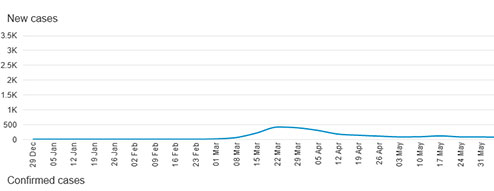
Source: https://www.who.int/countries/cze/
In the official chart by the World Health Organization, we can see that the strict anti-epidemic measures came directly at the time of a significant growth in the number of confirmed cases, i.e. in March. During April, probably as a result of the implemented strict measures, numbers started to decrease notably. Czechia was successful at keeping the numbers of the infected low practically until the summer months. In general, the Czech Republic in the spring of 2020 was among the best European countries in managing the coronavirus pandemic. Journalists from the western media even addressed the Czech authorities and called their colleagues in Prague with questions of how it is possible that the country had handled the first wave of the pandemic so well. (Vasilko: Tisicíka padla skôr ako sa čakalo. Kde urobili Česi v boji s koronou chybu?: https://dennikn.sk/2033041/tisicka-padla-skor-ako-sa-cakalo-kde-urobili-cesi-v-boji-s-koronou-chybu/#).
The explanation could be simple. Epidemiologist Rastislav Maďar told the Slovak newspaper Denník N that the Czech Republic managed the first wave of the pandemic successfully for two main reasons – early implementation of relatively tough and efficient measures and discipline of the people. In other words - because of the society’s fear of the unknown virus and its uncontested respect for the governmental measures. (Vasilko: Epidemiológ Maďar: Keď bude problém v Trebišove, prečo by sa mala zatvárať Bratislava?: https://dennikn.sk/1944632/epidemiolog-madar-pri-druhej-vlne-treba-konat-regionalne-ked-bude-problem-v-trebisove-preco-by-sa-mala-zatvarat-bratislava/?ref=in).
It seemed that the first superbly managed reaction on the pandemic had united the Czech nation. However, during the summer months, an increasing wave of scepticism started to spread in the Czech media environment, and especially in the environment of social networks. This could have been significantly influenced by the chaotic government regulations. Wearing face masks in public transport, indoors, and during the spring months also outdoors, was mandatory in Czechia. However, with the upcoming summer months, the public started to show more and more that its opinion on wearing face masks during hot summer days is not uniform. The government reacted by unreadiness – one day, the face masks were compulsory, the other there were limited exemptions. (Přádová: Nasadit, sundat. Nasadit, sundat. Nošení roušek se má na léto proměnit: https://www.seznamzpravy.cz/clanek/nasadit-sundat-nasadit-sundat-noseni-rousek-se-ma-na-leto-promenit-101351). Confused communication of governmental measures could thus have contributed to the ever-rising number of sceptical voices mainly on social networks. During the summer months in the Czech Republic, contrary to Slovakia, face masks were not compulsory practically anywhere indoors or in public transport, with the exception of the Prague metro. And although the media continued to inform about the current numbers of cases of infection, the mood in the society was relaxed and day-to-day lives of people were practically running without any restrictions. Despite the still very serious situation, mainly in the United States and Latin America, relatively peculiar and essential news that aptly reflects the atmosphere in the Czech society at the time reached the media environment in the Czech Republic. On the first day of July, a so-called farewell to coronavirus crisis was held on Charles Bridge – one of the most significant tourist attractions of the capital city Prague. According to the organizers, a half kilometre long table set for two thousand people was supposed to symbolize the willingness of people to meet each other and not fear human contact. The mass event organized through social networks and really massively covered by all local media could have sent a clear message to the Czechs – coronavirus is on the decline, let’s quit being scared of it and let’s gradually return to our old ways of living. All this happened in a time, when the World Health Organization warned that the pandemic is not over by far. The organizers themselves also admitted to a BBC reporter the possibility that the celebrations might be premature. “We all had a feeling that thanks to a fast and resolute reaction, Czechia has dodged a bullet. Because of that, Charles Bridge was full of optimism and everybody was reminded of what it means to live again.” (Polaczyková: Svět se diví. Češi na Karlově mostě slavili konec krize, pandemie přitom trvá: https://www.denik.cz/z_domova/praha-karluv-most-koronavirus-stul-20200701.html).

Source: https://www.denik.cz/galerie/hodovani-na-karlove-moste.html?photo=8&back=3695650035-36-1
Could the later contestation of the official governmental strategy and measures implemented to fight the corona-crisis have paradoxically been influenced by its exemplar handling during the first wave of the pandemic? It is certain that after the massive coverage of “the farewell to corona-crisis” on Charles Bridge, alternative opinions on COVID-19 and on the methods of handling the crisis situation have started to increase, especially in the environment of Czech social networks.
Overnight, actors or singers with exceptional reach on social networks became experts on infectious diseases. Influence and easy transmission of their subjective views, often unfounded in scientific studies or professional education, was the sole entry ticket to public debate that could have, and in this case still can, strongly influence behaviour of the majority in the crisis situation. At this point, we are getting to the clarification of our paper’s title, as the media environment in the Czech Republic is currently full of exhibitions of idiocracy – a society that prefers impressions over expertise and where the number of shares and likes wins over arguments supported by experts and based on renowned scientific studies. One of the most popular Czech singers, Lucie Bíla, called coronavirus “a silly flu that can easily be overcome.” Her video, spread from the middle of September on the social network Facebook, has more than 23000 likes and 4500 shares. Another strong opponent of face masks and stricter measures is the popular Czech singer Janek Ledecký. His video and posts aimed at downplaying the pandemic are also reaching thousands of likes and shares on social networks. He has thus joined the large number of well-known faces in Czechia that downplay the dangerousness of the pandemic.
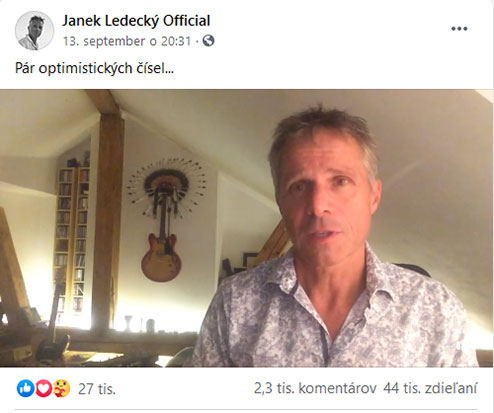
Source: https://www.facebook.com/LedeckyJanek
In connection to the Covid-19 pandemic, the society “has agreed” on a strange consensus that every opinion in a debate matters. As stated by the Slovak Denník N: “Of course, everybody has a right to comment on whatever they want, but it is necessary to add that not everyone who claims to be an expert is an expert. In relation to this, the Czech biologist Vojtěch Novotný stated that it is completely all right to let a cardiologist advise epidemiologists on how to approach the pandemic, if they then let them try to repair a valve of one of their patients.”
Not even half a year has gone by, and the leader in managing the pandemic has become one of the most affected countries. At the beginning of September, numbers of infected patients in the Czech Republic started to grow exponentially.
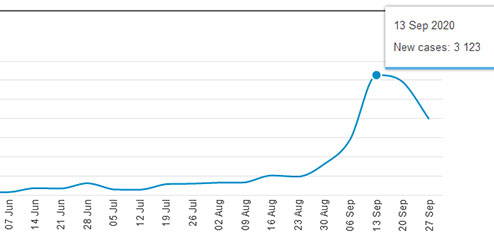
Source: https://www.who.int/countries/cze/
Total number of 1164 newly infected people on Tuesday, September the 8th, was only 12 people less than the same day number in eight times more populous Germany. Czechs were the third worst in the Central Europe in the number of new positively diagnosed cases, approximately three times more per capita than Slovakia. Moreover, the last days of September in Czechia show not only an increase in confirmed cases, but also a growing number of hospitalized patients and people fighting for their lives on mechanical ventilation.
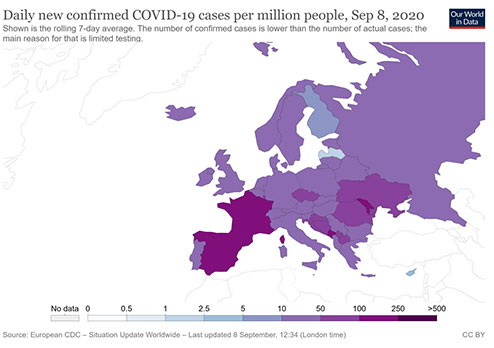
Source: https://a-static.projektn.sk/2020/09/coronavirus-data-explorer-22.png
Situation in Slovakia
The first positive case of coronavirus infection in Slovakia was confirmed on the 6 March 2020, i.e. five days after the first confirmed cases in the neighbouring Czech Republic. (Slovensko zaznamenalo prvý potvrdený prípad ochorenia COVID-19: https://www.uvzsr.sk/index.php?option=com_content&view=article&id=4061:slovensko-zaznamenalo-prvy-potvrdeny-pripad-ochorenia-covid-19&catid=250:koronavirus-2019-ncov&Itemid=153). Slovak government had quickly taken very strict measures – schools and borders were closed, cultural and sports events were banned, and face masks were compulsory both indoors and outdoors. While the Slovak Republic reached a record number of the confirmed cases of infection on April the 12th (102 infected people for 1326 tests), the spread, according to the available data, was slowing down during the summer months. However, it is also necessary to mention the fact that the testing had also been cut down: (July 4th/808 tests, July 18th/410 tests, July 19th/24 tests), which logically also decreases the potential to detect new cases. (Počet testovaných na Covid-19 na Slovensku: https://public.flourish.studio/visualisation/1704736/). Until September 30th, tests in Slovakia revealed 10141 cases in total. (Koronavírus na Slovensku v číslach: https://korona.gov.sk/koronavirus-na-slovensku-v-cislach/).
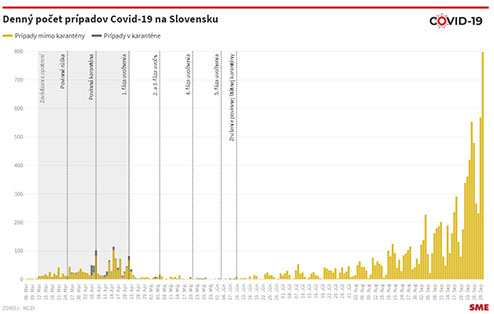
Daily number of cases of Covid-19 in Slovakia. Source: https://public.flourish.studio/visualisation/2605317/
The testing and the numbers of newly detected cases were not the only things in decline. The Slovak society has started to encounter an open contempt for education, professional qualification, and work experience. The Slovak (and global) media environment is encountering a collision of opinions, where one side doubts seriousness of the COVID-19 disease, while the other regularly calls attention to it and warns against underestimating the situation. This has led to a weakened conviction of the public to adhere to the rules related to the pandemic. There are several world-renowned personalities who refuse to get vaccinated in the future, such as the tennis player Novak Djokovic (Pattle: Novak Djokovic clarifies anti-vax stance ahead of Cincinnati Masters and US Open: https://www.independent.co.uk/sport/tennis/novak-djokovic-us-open-cincinnati-masters-draw-anti-vax-coronavirus-a9682226.html) or the billionaire and technological visionary Elon Musk (Setty: Elon Musk doubles down on Covid-19 skepticism and says he won't take future vaccine: https://edition.cnn.com/2020/09/29/business/elon-musk-nyt-podcast-covid-vaccine/index.html).
In May, the MNFORCE Company and the communication agency Seesame published a survey conducted in April in cooperation with the Institute for Sociology of the Slovak Academy of Sciences (SAS) and the Institute for Research in Social Communication of the SAS. It showed that less than half of the Slovaks would get a coronavirus vaccine. (Horák: Nový prieskum: očkovať proti koronavírusu by sa dala menej ako polovica Slovákov: https://dennikn.sk/1884358/novy-prieskum-ockovat-na-koronavirus-by-sa-dala-menej-ako-polovica-slovakov/). It was followed by a survey by the Focus agency that took place in late August/early September. This one showed that a third of Slovaks refuse to wear face masks as a protection against coronavirus. (Tretina Slovákov odmieta na ochranu pred koronavírusom nosiť rúška, ukázal prieskum: https://www.webnoviny.sk/vzdravotnictve/tretina-slovakov-odmieta-na-ochranu-pred-koronavirusom-nosit-ruska-ukazal-prieskum/). At the same time, the epidemiologist Andrea Kološová thinks that a vaccine against coronavirus should be mandatory. (Horák: Epidemiologička: Z medicínskeho hľadiska som za to, aby bola vakcína proti koronavírusu povinná: https://dennikn.sk/1948737/epidemiologicka-z-medicinskeho-hladiska-som-za-to-aby-bola-vakcina-proti-koronavirusu-povinna/).
Let’s also mention that in the last week of September, several records in the number of confirmed cases had been recorded. The highest record was on September 29th and revealed 567 infected people out of 6483 tests performed. (Ďalšie vysoké číslo: V utorok pribudlo 567 prípadov COVID-19: https://www.teraz.sk/slovensko/na-slovensku-v-utorok-pribudlo-567-prip/496905-clanok.html). Is the adverse situation a result of an information war during the ongoing pandemic? Are people today influenced by disinformation so much or do they just refuse to reduce their personal comfort? Are we living in a time when scientifically proven facts do not count? Are media also responsible for this situation? Most likely, we will not find answers to these difficult questions in this paper, but we know of cases in both the Czech Republic and Slovakia, when journalists and experts got into a sharp confrontation with those spreading false information about coronavirus and contesting the seriousness of the situation.
For instance, in August interview, nutrition consultant Igor Bukovský and oncologist Vladimír Malec agreed that COVID-19 is a banal disease and contested conclusions of renowned epidemiologists. (Doktor Vladimír Malec: Táto epidémia nebude večná a hystéria je neopodstatnená: https://www.youtube.com/watch?v=2VBmD0Qn4Ho). Molecular biologist and geneticist Tomáš Szemes reacted to these statements and described coronavirus as “highly infectious” and added that “it is not in the least a banal matter”. Immunologist Vladimír Leksa from the Institute of Molecular Biology of the SAS said that “COVID-19 is not in any way a banal disease” and added that “it is irresponsible to underestimate it.” (Horák: COVID-19 ako banálne ochorenie? Ani omylom, reagujú vedci. Výber chýb Bukovského a Maleca (1. časť): https://dennikn.sk/2025595/covid-19-ako-banalne-ochorenie-ani-omylom-reaguju-vedci-vyber-chyb-bukovskeho-a-maleca-1-cast/). Slovak writer Jozef Banáš also questioned the seriousness of the situation on Facebook, supported the words of Igor Bukovský, and added that all doctors who do not want us healthy but rather want to stuff us with drugs and sera adored by “the experts” should hand back their degrees. (Banáš: https://www.facebook.com/banas.jozo/posts/3227373870708489). Other popular opinions in Slovakia are those of Marián Kotleba, a leader of an extremist party, who refused to put on a face mask in a TV political debate in September, despite being called upon by the presenter. (Stanovisko RTVS k nedeľnej účasti Mariana Kotlebu v relácii O 5 minút12: https://www.rtvs.sk/televizia/clanky/235271/stanovisko-rtvs-k-nedelnej-ucasti-mariana-kotlebu-v-relacii-o-5-minut12). Prime Minister Igor Matovič did not improve the situation by going to a wedding with 150 guests not wearing a face mask. (Gehrerová: Matovič bol na svadbe so 150 hosťami bez rúška. Urobili sme maximum, tvrdí ženích Šipoš z OĽaNO: https://dennikn.sk/2020380/matovic-bol-na-svadbe-so-150-hostami-bez-ruska-urobili-sme-maximum-hovori-zenich-sipos-z-olano/). During the rapid increase in numbers of cases, Matovič, who regularly uses his Facebook account to communicate with the public, wrote of “tactics of disruption” and that all key media are in the hands of oligarchs. (Matovič: https://www.facebook.com/igor.matovic.7/posts/ 10220512977026902).
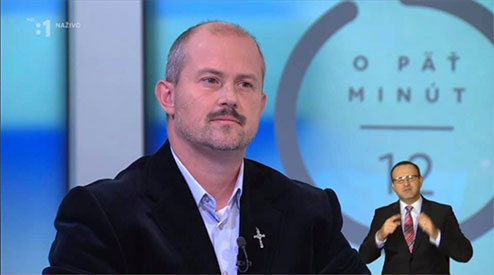
Marián Kotleba refused to wear a face mask in a political programme. Source: RTVS
Conclusion
According to the Dictionary of the Selected Terms from Media Studies, the power of media lies in their ability to achieve the targeted impacts. Media have the tools and methods to form the public opinion. (Slovník vybraných pojmov z mediálnych štúdií, 2016). Jana Radošinská, Zuzana Kvetanová, and Ján Višňovský think that we are still far from comprehending the political, economic, and institutional boundaries of media production in their complexity. (Radošinská, Kvetanová, Višňovský http). For example, a survey among the Press Gazette readers from June 2020 shows that ¾ of the respondents think that media are doing a bad job in combating the spread of conspiracies connected to the pandemic. (Ponsford http). Investigative journalist David Leigh describes the current problem with information transmission from the technological point of view. He speaks of Google and algorithms which, despite their complexity and sophistication, offer the same availability of both the credible and unverified information. Leigh remarks that the fake and ill-founded stories spread even more successfully than the genuine ones. (Leigh 2019). An answer to this problem may be found in the words of Mark Deuze, who states that “most of the debates and discussions about the pandemic do not just concern the virus and its impact, but focus especially on the roles of expert information provision, news coverage, government communications, and social media. It is clear that the coronavirus pandemic is a mediatized event as much as it is a virus that infects millions of people around the world.” (Deuze http).
__________________
Bibliography:
Deuze, M. The Role of Media and Mass Communication Theory in the Global Pandemic. In: Communication Today. Fakulta masmedialnej komunikacie UCM v Trnave, Vol. 11, No. 2, 2020, p. 4-16.
Leigh, D. Investigative Journalism: A Survival Guide. London : Palgrave Macmillan, 2019, 220 p.
Pravdová, H., Radošinská, J., Višňovský, J. a kol. Slovník vybraných pojmov z mediálnych štúdií: Kľúčové termíny v súčasnej mediálnej komunikácii. Trnava : Fakulta masmedialnej komunikacie UCM v Trnave, 2016, p. 132.
Radošinská, J., Višňovský, J., Kvetanová, Z. To thrive means to entertain: the nature of today's media industries. In: Communication Today. Fakulta masmedialnej komunikacie UCM v Trnave, Vol. 11, No. 1, 2020, p. 4-21.
Reference list:
Doktor Vladimír Malec: Táto epidémia nebude večná a hystéria je neopodstatnená. (online). (2020-10-01). Available at: <https://www.youtube.com/watch?v=2VBmD0Qn4Ho>.
Ďalšie vysoké číslo: V utorok pribudlo 567 prípadov COVID-19. Available at: < https://www.teraz.sk/slovensko/na-slovensku-v-utorok-pribudlo-567-prip/496905-clanok.html>.
Facebook Igora Matoviča. (online). (2020-10-01). Available at: <https://www.facebook.com/igor.matovic.7/posts/10220512977026902>.
Facebook Jozefa Banáša. (online). (2020-10-01). Available at: <https://www.facebook.com/banas.jozo/posts/3227373870708489>.
Gehrerová, R. Matovič bol na svadbe so 150 hosťami bez rúška. Urobili sme maximum, tvrdí ženích Šipoš z OĽaNO. (online). (2020-10-01). Available at: <https://dennikn.sk/2020380/matovic-bol-na-svadbe-so-150-hostami-bez-ruska-urobili-sme-maximum-hovori-zenich-sipos-z-olano/>.
Horák, O. COVID-19 ako banálne ochorenie? Ani omylom, reagujú vedci. Výber chýb Bukovského a Maleca (1. časť). (online). (2020-10-01). Available at: <https://dennikn.sk/2025595/covid-19-ako-banalne-ochorenie-ani-omylom-reaguju-vedci-vyber-chyb-bukovskeho-a-maleca-1-cast/>.
Horák, O. Epidemiologička: Z medicínskeho hľadiska som za to, aby bola vakcína proti koronavírusu povinná. (online). (2020-10-01). Available at: < https://dennikn.sk/1948737/epidemiologicka-z-medicinskeho-hladiska-som-za-to-aby-bola-vakcina-proti-koronavirusu-povinna/>.
Horák, O. Nový prieskum: očkovať proti koronavírusu by sa dala menej ako polovica Slovákov. (online). (2020-10-01). Available at: <https://dennikn.sk/1884358/novy-prieskum-ockovat-na-koronavirus-by-sa-dala-menej-ako-polovica-slovakov/>.
Idiocracy: ? (online). (2020-10-01). Available at: <www.urbandictionary.com/define.php?term=Idiocracy>.
Nový koronavirus je v Česku. Jak snížit riziko nákazy? Nabízíme základní otázky a odpovědi. (online). (2020-10-01). Available at: <https://ct24.ceskatelevize.cz/veda/3036688-jak-moc-je-novy-koronavirus-z-ciny-smrtici-a-existuje-riziko-pro-cesko-nabizime>.
Počet testovaných na Covid-19 na Slovensku. (online). (2020-10-01). Available at: <https://public.flourish.studio/visualisation/1704736/>.
Pattle, A. Novak Djokovic clarifies anti-vax stance ahead of Cincinnati Masters and US Open. (online). (2020-10-01). Available at: <https://www.independent.co.uk/sport/tennis/novak-djokovic-us-open-cincinnati-masters-draw-anti-vax-coronavirus-a9682226.html>.
Polaczyková, T. Svět se diví. Češi na Karlově mostě slavili konec krize, pandemie přitom trvá. (online). (2020-10-01). Available at: <https://www.denik.cz/z_domova/praha-karluv-most-koronavirus-stul-20200701.html>.
Přádová, D. Nasadit, sundat. Nasadit, sundat. Nošení roušek se má na léto proměnit. (online). (2020-10-01). Available at: <https://www.seznamzpravy.cz/clanek/nasadit-sundat-nasadit-sundat-noseni-rousek-se-ma-na-leto-promenit-101351>.
Rott, L. V Česku jsou první tři případy nákazy koronavirem, potvrdil ministr Vojtěch. (online). (2020-10-01). Available at: <https://www.denik.cz/z_domova/koronavirus-v-cesku-prvni-potvrzeny-pripad-20200226.html>.
Slovensko zaznamenalo prvý potvrdený prípad ochorenia COVID-19. (online). (2020-10-01). Available at: < https://www.uvzsr.sk/index.php?option=com_content&view=article&id=4061:slovensko-zaznamenalo-prvy-potvrdeny-pripad-ochorenia-covid-19&catid=250:koronavirus-2019-ncov&Itemid=153>.
Somodiová, Ľ. Prečo koronavírus devastuje najmä sever Talianska? Vedci z Bologne zrejme našli odpoveď. (online). (2020-10-01). Available at: <www.dobrenoviny.sk/c/181610/preco-koronavirus-devastuje-najma-sever-talianska-vedci-z-bologne-nasli-odpoved>.
Stanovisko RTVS k nedeľnej účasti Mariana Kotlebu v relácii O 5 minút12. (online). (2020-10-01). Available at: <https://www.rtvs.sk/televizia/clanky/235271/stanovisko-rtvs-k-nedelnej-ucasti-mariana-kotlebu-v-relacii-o-5-minut12>.
Tretina Slovákov odmieta na ochranu pred koronavírusom nosiť rúška, ukázal prieskum. (online). (2020-10-01). Available at: < https://www.webnoviny.sk/vzdravotnictve/tretina-slovakov-odmieta-na-ochranu-pred-koronavirusom-nosit-ruska-ukazal-prieskum/>.
Vasilko, T. Epidemiológ Maďar: Keď bude problém v Trebišove, prečo by sa mala zatvárať Bratislava? (online). (2020-10-01). Available at: <https://dennikn.sk/1944632/epidemiolog-madar-pri-druhej-vlne-treba-konat-regionalne-ked-bude-problem-v-trebisove-preco-by-sa-mala-zatvarat-bratislava/?ref=in>.
Vasilko, T. Tisícka padla skôr ako sa čakalo. Kde urobili Česi v boji s koronou chybu? (online). (2020-10-01). Available at: <https://dennikn.sk/2033041/tisicka-padla-skor-ako-sa-cakalo-kde-urobili-cesi-v-boji-s-koronou-chybu/#>.
What does Idiocracy mean? (online). (2020-10-01). Available at: <www.dictionary.com/e/pop-culture/idiocracy>.
__________________


